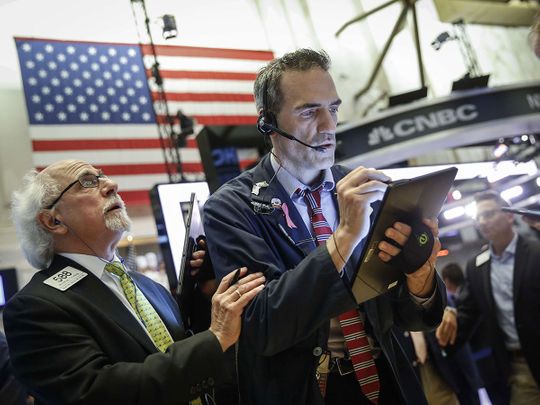
Dubai: As global equity markets cautiously stayed on its unabated liquidity-driven upward trajectory, investor sentiment this week is seen focussing on US’ tolerant stance for higher inflation, as the top economy battled the pandemic, like other nations worldwide.
Markets turned volatile after the US Federal Reserve Chairman Jerome Powell laid out a policy that aims for 2 per cent inflation on average so that too low a pace would be followed by an effort to lift inflation “moderately above 2 per cent for some time.”
See more
- Unveiled: 5-in-1 products form new 'Samsung ecosystem'
- 75 cities: Emirates flying to these destinations
- Tourism inching back to normal in Greece's Areopoli amid COVID-19
- Meet the billionaires who dropped out of college (or Ph.D.)
- Here is a look at the recent Forbes list of top Women Behind Middle Eastern Brand 2020
Choppy trading
After the announcement, MSCI’s broadest index of Asia-Pacific shares outside Japan bounced between gains and losses in choppy trade and MSCI’s gauge of stocks across the globe shed 0.14 per cent. Emerging market stocks lost 0.19 per cent.
On Wall Street, the Dow Jones rose 0.57 per cent, the S&P 500 gained 0.17 per cent, both setting new single-day highs. However, the Nasdaq dropped 0.34 per cent. Australian stocks fell 0.85 percent, but shares in Asia largely rose. Shares in China and Tokyo gained, and so did Hong Kong’s Hang Seng index.
Weekly gains
“Global equity markets performed positively during the week, boosted by a sustained buying activity in tech stocks to record gains for the fifth consecutive week by Nasdaq and S&P 500,” said Iyad Abu Hweij, managing director at Allied Investment Partners PJSC.
“Additionally, news about potential vaccines and treatments for COVID-19 also boosted sentiments, especially in hospitality and airlines stocks as they would benefit from an expected full reopening of economies.”
Weighing US Fed commentary
Powell’s comments were widely expected, but there was some disappointment as the Fed did not reveal more details about how the new framework will work or provide any clues to what it will do at its next policy meeting, analysts cited.
As government negotiations in the US on another coronavirus aid package have stalled, this is increasing cause for caution that this will eventually threaten the equity-market rally. Meanwhile, oil futures fell due to easing concern about the impact of a hurricane that struck the centre of the US oil industry.
Crude oil was last seen declining 0.28 per cent to $42.90 per barrel as Hurricane Laura, which initially made landfall in the heart of the US oil industry and forced oil rigs and refineries to shut down, began to weaken.
UAE, Gulf markets little changed
Alongside UAE bourses, major stock markets in the Gulf witnessed a day of quiet trading on Sunday in the absence of new catalysts, while also reflecting wider market cautiousness seen on a global level.
Dubai’s main share index eased 0.3 per cent, with its largest lender Emirates NBD losing 0.9 per cent and Emirates Integrated Telecommunications (du) shedding 3.9 per cent. In Abu Dhabi, the benchmark ended marginally up.
The Dubai Financial Market (DFM) slipped 0.5 per cent last week, largely falling through the week. Meanwhile, the Abu Dhabi Securities Exchange (ADX) too fell 0.6 per cent last week, falling for two out of four sessions last week.
Both the Dubai and Abu Dhabi bourses have been tracking sentiments seen in markets worldwide. Trading on the UAE benchmarks have turned much confident the past weeks, just like the global stock markets. However, trading had turned quite lull last week, after amassing record gains during the month.
Confidence soars in August
“For the MENA region, equity markets continued the positive sentiments, making August the best performing month of the year. Having said that, the regional equity markets continue to remain in negative territory as investors seem to believe that are a number of hurdles to pass before turning positive about regional outlook,” Iyad Abu Hweij added.
“Going forward, in MENA, the equity markets might continue to underperform its global peers as weakness in corporate earnings and economic headwinds will restrict the upside going forward.”
After dropping about 4 per cent in the month of May, the DFM rose 6 per cent in the month of June but slipped 0.5 per cent in July. Similarly, the ADX slipped 2 per cent in May and rose 3.5 per cent in June but slipped 0.2 per cent in July.
Amassing bigger gains in August, the DFM gained 9.8 per cent in the current month, whereas the ADX gained 4.9 per cent.
Elsewhere the Saudi Arabia stock market rose in early trade on Sunday, led by gains in financial shares. The Saudi benchmark index firmed by 0.6 per cent, led by a 1 per cent gain in Riyad Bank and a 0.7 per cent increase in Gulf’s largest petrochemical firm Saudi Basic Industries.








